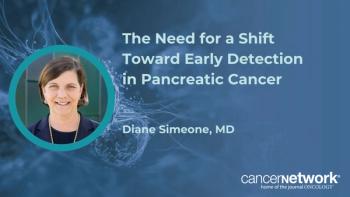
Data Show Men With MSI-High Gastric Cancer Have Worse Survival Vs Female Counterparts
Men with MSI-high gastric cancer may have shorter overall survival than women, regardless of treatment modality.
Compared with women, men with microsatellite instability (MSI)–high gastric cancer have shorter overall survival (OS), regardless of treatment modality, according to a presentation from the
A trend in overall survival showed male patients with gastric cancer had worse outcomes than their female counterparts. Additionally, MSI was shown as a favorable prognostic factor for women with gastric cancer, but not men.
“Sex differences should be taken into account in future clinical trials in gastric cancer, [Additionally], translational studies are warranted to understand the biology underlying these sex differences,” Hedde Biesma, BSc, of Amsterdam University Medical Centers, said during the presentation.
Data from a total of 1307 patients were analyzed–including those from the Cologne cohort and the phase 3 D1D2 and CRITICS (NCT00407186) trials—of whom 115 (8.8%) were characterized as having MSI-high gastric cancer. The Cologne cohort was a retrospective cohort study in which patients were treated with surgery only or perioperative therapy. In D1D2, patients were treated with surgery only and no systemic treatment. Patients on the CRITICS trial were treated with perioperative radiotherapy chemotherapy with or without radiotherapy.2
Investigators determined MSI status by polymerase chain reaction. The mismatch repair status was determined by protein immunohistochemistry.
Of the patients with MSI-high tumors, 48 were women and 67 were men. Patient characteristics included a median age of 71 years (range, 66-77) for women vs 69 years (range, 62-76) for men (P = .15) and surgery as the only treatment for 32 women (66.7%) and 44 men (66.7%).
Distally located tumors were most prevalent in women, accounting for two-thirds (66.7%) of the cases. Investigators noted that only 2 women (4.2%) had gastroesophageal junction or proximally located tumors vs 22 men (32.8%). Corpus or middle located tumor occurred in 11 women (22.9%) and 8 men (11.9%; P <.001).
No major differences in Lauren classification (P = .22) were noted. Interestingly, more men had disease characterized by pT4 stage vs women (31.3% vs 16.7%, respectively; P = .13) as well as pN3 nodal status (14.9% vs 4.2%; P = .06), but neither difference reach statistical significance.
The survival difference between men and women was observed in patients who received either surgery alone or those who were treated with perioperative chemotherapy. In both groups, it was found that men with MSI-high tumors had the worst OS outcomes, men and women with microsatellite stable tumors performed slightly better, and women with MSI-high gastric cancer had the greatest OS outcomes across the board.
“We should focus on translational studies to understand the biology underlying these sex differences,” Biesma concluded.
References
1. Biesma H, et al. Microsatellite instability and sex differences in resectable gastric cancer. Presented at: 2022 International Gastric Cancer Congress; March, 6-9, 2022; Houston, TX.
2. Cats A, Jansen EPM, van Grieken NCT, et al. Chemotherapy versus chemoradiotherapy after surgery and preoperative chemotherapy for resectable gastric cancer (CRITICS): an international, open-label, randomised phase 3 trial. Lancet Oncol. 2018;19(5):616-628. doi:10.1016/S1470-2045(18)30132-3
Newsletter
Stay up to date on recent advances in the multidisciplinary approach to cancer.





































